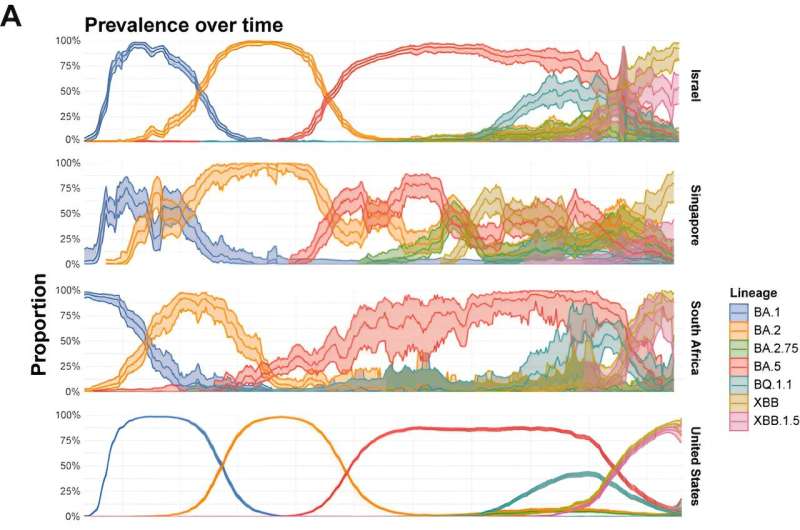This article has been reviewed according to Science X's editorial process and policies. Editors have highlighted the following attributes while ensuring the content's credibility:
fact-checked
trusted source
proofread
Study classifies SARS viruses and variants into three serotypes, marks need for broad-spectrum vaccines

Scientists led by a team from Duke-NUS Medical School have identified three distinct serotypes of SARS-related coronaviruses, marking the need for vaccines that can provide broad-spectrum protection against them.
This discovery, published in the journal hLife, suggests that immunity from vaccination or prior infection by one serotype may be ineffective against another or against new variants. This is because while the viruses of different serotypes can be genetically similar, they function and affect our immune system differently.
The research team, which included scientists from Singapore's National Center for Infectious Diseases, KK Women's and Children's Hospital, Center Scientifique de Monaco and the African Health Research Institute, analyzed 80 samples from unvaccinated people who were infected by various SARS-related coronaviruses.
Previous analyses had been conducted using samples from only animals or vaccinated people. These were therefore not as accurate or relevant in determining how different viruses affect the human immune system.
Since the detection of SARS-CoV-2 in December 2019, the virus has evolved extensively. The resulting variants are of concern because they are either more transmissible or resistant to antibodies that block infection. The SARS-CoV-2 omicron variant was detected in late November 2021, carrying more than 30 amino acid mutations in the spike protein.
Since then, multiple omicron subvariants have rapidly emerged, likely because vaccinations have improved immunity to the previous virus strains. As of early 2023, omicron XBB dominated coronavirus infections worldwide, with subvariants continuing to evolve. This poses serious challenges to the effectiveness of existing immunity from natural infection or vaccination, and the development of next-generation vaccines.
The scientists determined that one serotype comprises the SARS-CoV-1 virus (from the SARS outbreak of 2003). SARS-CoV-2 and its delta and beta variants make up the second serotype. While the omicron subvariants (BA.1, BA.2, BA.5) originated from SARS-CoV-2, they have evolved functionally to become a distinct group and make up the third serotype. This is supported by data showing that serum from people infected with SARS-CoV-2 was not able to neutralize viruses from its omicron subvariants (BA.1, BA.2, BA.5) or even from SARS-CoV-1.
The team also found that the latest subvariants, omicron XBB and BQ.1.1, have evolved to such a degree that, functionally, they are more similar to SARS-CoV-1 than their ancestral SARS-CoV-2 virus.
"The strong selective pressure driven by population immunity favors the emergence of new virus variants. Omicron variants are distinct from their ancestral SARS-CoV-2 virus and can be regarded as a distinct group in the context of antibody immune responses. This implies that pre-existing SARS-CoV-2 immunity is insufficient to prevent current and future infections," said co-first author Dr. Tan Chee Wah, Principal Research Scientist with the Emerging Infectious Diseases (EID) Program at Duke-NUS.
"It is critical for us to understand how newly emerging variants affect our immune system. In this light, serotyping has been a highly useful and proven approach to classify sub-species of viruses such as dengue viruses. The findings will impact future vaccine development and research on immunity testing using antibodies," added Dr. Zhu Feng, Senior Research Fellow with the EID Program at Duke-NUS and co-first author of the study.
"Viruses such as measles and polioviruses have evolved little to no change in their sensitivity to vaccine-induced immunity for decades," said senior author Professor Wang Linfa, a virus expert with Duke-NUS' EID Program. "This is not the case for the coronavirus spike protein. Its high structural plasticity, coupled with the vast diversity of animal coronaviruses, makes complete eradication an impossible task with current technology. We need vaccines that can provide protection against the broad spectrum of coronavirus serotypes."
With this knowledge, his team is now working on developing a next-generation vaccine that aims to broaden SARS-related coronavirus immunity. Progress has already been made in this area. The team has discovered exceptionally potent antibodies that can neutralize virtually all known variants of the COVID-19 virus.
Professor Patrick Tan, Senior Vice-Dean for Research at Duke-NUS, said, "This research by Professor Wang and his team arms us with new insights into the evolution of SARS-related coronaviruses, with important implications for global COVID-19 vaccine strategies. By expanding the boundaries of our knowledge, such research can guide the development of more effective interventions, vaccines and tools to enhance preparedness against future outbreaks, not only in Singapore but around the world."
More information: Chee Wah Tan et al, Distinctive serotypes of SARS-related coronaviruses defined by convalescent sera from unvaccinated individuals, hLife (2023). DOI: 10.1016/j.hlife.2023.07.002




















